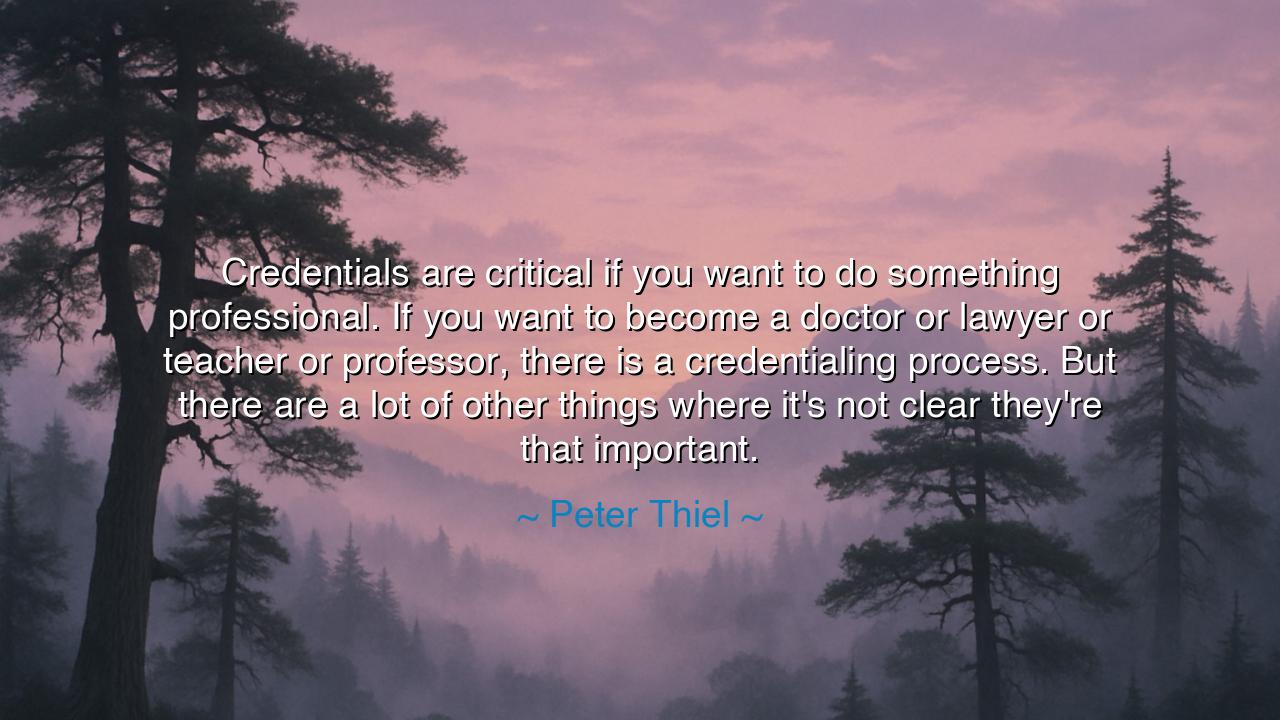
Credentials are critical if you want to do something
Credentials are critical if you want to do something professional. If you want to become a doctor or lawyer or teacher or professor, there is a credentialing process. But there are a lot of other things where it's not clear they're that important.






The words of Peter Thiel, “Credentials are critical if you want to do something professional. If you want to become a doctor or lawyer or teacher or professor, there is a credentialing process. But there are a lot of other things where it’s not clear they’re that important,” shine a torch into one of the great struggles of our age: the difference between the stamp of approval from institutions and the living flame of true ability. Here is both a recognition of order and a warning against illusion. For in certain crafts of life—where the body, the law, and the soul of society are at stake—credentials serve as guardians. Yet beyond those walls, they may prove little more than parchment, fragile before the test of reality.
Thiel’s voice is that of one who has walked in the marketplace of ambition, who has seen scholars crowned with degrees yet bankrupt in creativity, and outsiders with no title to their name who build empires of thought and wealth. He acknowledges that in the sacred callings—medicine, law, teaching—the seal of society ensures that those who guide, heal, or judge have been tempered in discipline. To perform such duties without rigorous proof would be to play recklessly with the lives of others. In this, credentials are not vanity, but necessity.
Yet the second half of his truth must not be overlooked. For there are fields—entrepreneurship, invention, the arts, the rise of new technologies—where credentials weigh little. Did the Wright brothers have certificates in aeronautics when they first bent wood and cloth to conquer the sky? Did Shakespeare parade a degree from a great university when he penned the words that gave voice to kings and beggars alike? The soil of history is rich with the deeds of those who, though lacking formal blessing, carried within them the sacred fire of vision.
One need only recall the story of Steve Jobs. He dropped out of college, leaving behind the comfort of institutional credentialing. Yet with restless spirit, he went on to reshape the very world, marrying art and technology in devices that now rest in the hands of millions. His life reminds us that while diplomas may open doors, it is imagination, perseverance, and courage that allow us to walk through them and build new worlds. Had Jobs waited for credentials to grant him permission, perhaps his vision would have withered in the cradle.
The ancients too bore witness to this truth. Socrates, who questioned the Athenians and taught the youth, had no certificate hanging on his wall. His credential was wisdom itself, recognized not by a seal of office but by the echo of truth that stirred the soul of those who heard him. His life is proof that sometimes the greatest authority lies not in the recognition of men, but in the strength of one’s insight and the boldness of one’s speech.
From Thiel’s words, then, emerges a double teaching. Respect credentials where they serve the common good—where the lives and safety of others demand assurance of skill. Yet do not let the absence of them shackle your spirit. In all things beyond, let your true measure be found in what you build, what you speak, what you dare. The paper of approval is not the essence of greatness—it is but one path among many.
Therefore, let each of us act with discernment. Seek credentials where they are needed; honor the disciplines where knowledge must be tested and certified. But also cultivate within yourself the strength to create, even when no authority calls you worthy. Do not wait for permission to begin the work your soul demands. In the balance of humility and daring lies the path to mastery.
Thus, the teaching is clear: credentials may certify, but they cannot create; they may open gates, but they cannot build roads. The true credential is the fire of the human spirit, proven not in parchment, but in deed. And this is the path that every seeker of greatness must learn to walk.






AAdministratorAdministrator
Welcome, honored guests. Please leave a comment, we will respond soon